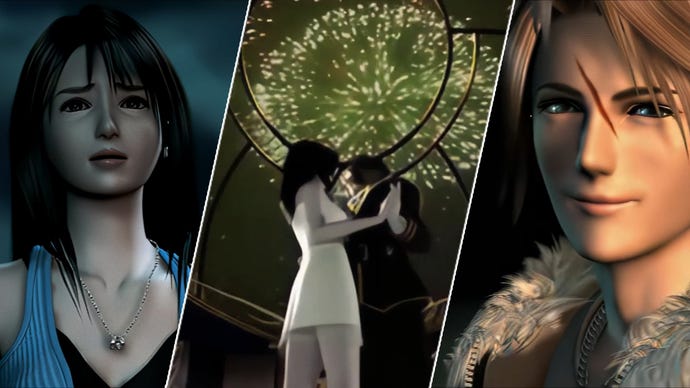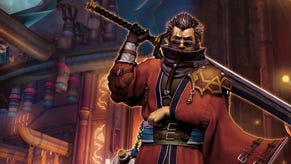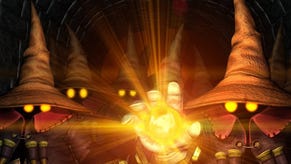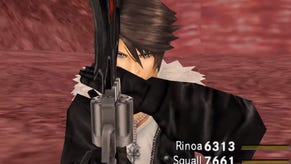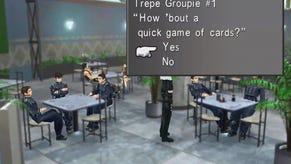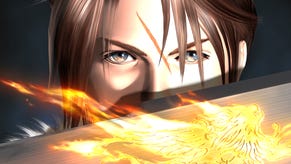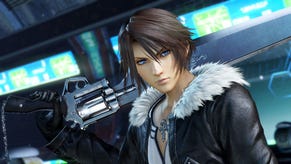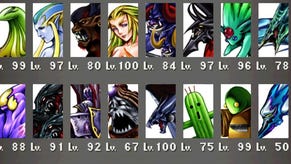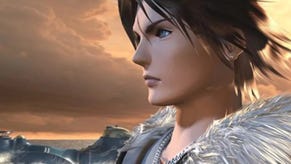25 years later, Final Fantasy 8 remains the best love story told in gaming
I'll be waiting for you. If you come here, you'll find me. I promise.
It’s probably no surprise that the most romantic Final Fantasy game was inspired by Baz Luhrmann’s Romeo + Juliet, is it? Final Fantasy 8, set with the unenviable task of following on from one of the most successful RPGs ever released, needed to rewrite the series’ DNA. It couldn’t simply retread the ground of Midgar and conjure up some facsimile of Cloud and Sephiroth’s story. No, it had to pull the series up by the roots, and start growing something wholly new.
This post contains spoilers for the events of Final Fantasy 8 (and Romeo & Juliet, but come on, we all know what happens).
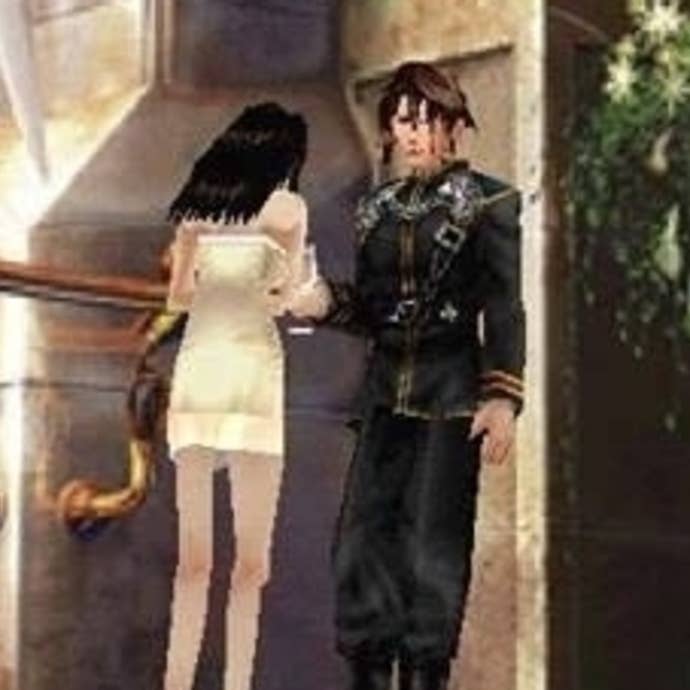
Fitting, then, that our story starts in a Garden. That’s the name of the school-cum-mercenary academy in which the main character, Squall, sets out on his journey. In an operatic, cinematic, and didactic opening cutscene, we see Squall engaged in a gunblade battle with erstwhile rival and antagonist, Seifer Almasy. Here, the stage is set: our young, floppy-haired weirdo is the hero, and his blonde, handsome friend is the villain. They wear black and white, but not the way around you expect. Because in the world of Final Fantasy 8, nothing is quite as binary as that.
10 years ago, in a June 2013 interview with IGN, long-time Final Fantasy director and character designer Tetsuya Nomura confirmed that yes, he was a bigger fan of movies than he is of games, and yes, Baz Luhrmann is one of his all-time favourite directors. Look at the opening scenes of both projects; in R+J, the floppy-haired weirdo twink Montague Boys throw down against the suave, sly Capulet Boys. In a gas station forecourt.
It’s not quite a gunblade battle in a stormy field (though, in R+J, the guns are called blades – go figure), but the vibe is right, and the allusions are clear. Nomura outright states in the old interview that Baz Lurhmann is one of his biggest cinematic inspirations, and if the opening to Final Fantasy 8 proves it, the rest of the game is a list of footnotes as to why.
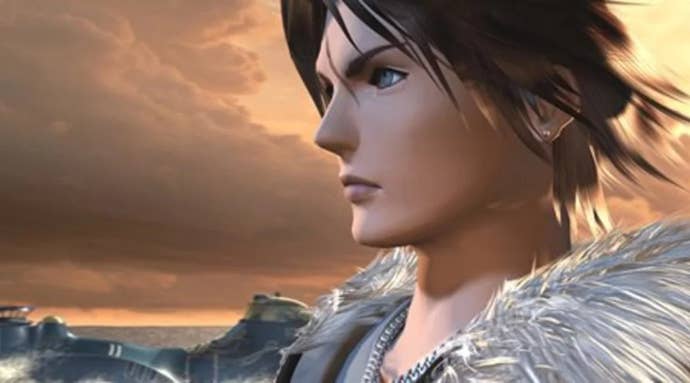
Within the opening hours, the international political scene is set, and your more intimate stakes are established: years ago, there was a sorceress that ruled the world with an iron fist. She was subjugated, and sent to space prison where her powers were sealed, and where she’d no longer be a threat. Now, a new sorceress has risen and appears hell-bent on world domination all over again – and she’s using the political heft of a nation that Definitely Isn’t Germany to achieve her goals. By invading Definitely Not France.
Squall, a recently graduated SeeD (read: mercenary) grows out of his Garden and into a leadership role in his quasi-military school. His first proper mission: support Rinoa, the leader of a resistance faction in a small, recently invaded city. He’s cold, distant, rude. She’s energetic, compassionate, enthusiastic. It’s hate at first sight; the perfect beginning of one of Final Fantasy’s most believable relationships.
Squall has severe abandonment issues, a whole heap of complex post-traumatic stress disorder, and a neurotic need to be able to look after himself – no matter how hard things get. He’s a porcupine. He won’t let anyone in, for fear he’ll hurt them (and end up abandoned, all over again). Rinoa, on the other hand, is privileged: the daughter of a general, keen to shrug off her status and stand with the people her country is helping subjugate. If it’s knotty emotionally, it’s a downright tapestry of complication politically.
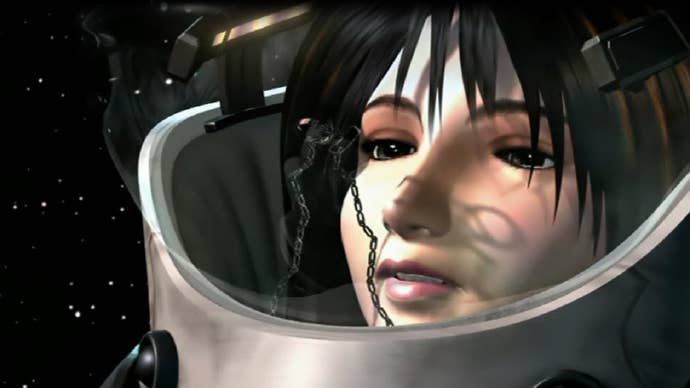
Final Fantasy 8 very much feels like the moody teenager of the Square Enix catalogue. It wanted to distance itself from what made the series an international megahit by being edgy and cold and weird, but it also had all these emotions – all this heart to show to the world – and was fairly uncertain how to do it. Watching the blunt force trauma of Squall meet the immovable optimism of Rinoa is tough at times, and is often outright cringey… but isn’t all teenage romance? The awkward moments, the selfish missteps, the barely-concealed carnal lust in the face of all-out worldwide war – the game has a very weird tone, but when you consider you’re seeing it through the eyes of a teenage boy whose scar on his forehead merely reflects the fucked-up tissue scored into his cortex, it sort-of makes sense.
And that’s why Final Fantasy 8 is such a strong love story. Watching Squall soften and understand his fatal flaw – and actually act on it in order to save the woman he realises he loves… it’s not like a lot of the other heroes we see in gaming. Throughout the four discs of Final Fantasy 8, Squall actually gets to enjoy a full redemption arc – he gets to experience self-reflection, self-growth, and even some self-love (not like that) in opening up to other people and giving back to them what he’s been taking all along.
Even if you’re not into all that emotional soppy s**t, there are some incredible moments that sum up the romantic heart pinned onto the leather jacket this game wears. Drifting through space – almost certainly on a suicidal mission just to hold Rinoa one last time – Squall will give her his literal last remaining breath, just to say goodbye. What a stupid idea! What a doomed, romantic idea! Realising the only way to save Rinoa (and, I suppose, the world itself) is to travel through time in order to defeat an intergalactic, timeless sorceress that’s using his girlfriend as a host body is f**king ludicrous. But it suits his character perfectly. Squall gives his everything to what he cares about – it’s just that before the events of the game, all he cared about was himself.
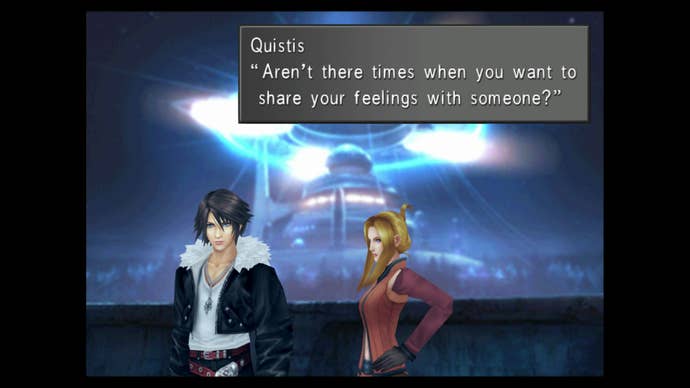
Where Romeo + Juliet ends in tragedy – you know, both kids die and the apothecary somehow gets off with no repercussions – Final Fantasy 8 ends with jubilance. Everyone survives, Squall saves the world, and Rinoa gets to fall into his yielding, willing arms. It’s not very realistic (and, let’s be honest, that relationship will fall apart real fast – as teenage love is wont to do), but god damn, if it isn’t a wholesome end to a tumultuous story.
Final Fantasy 8 may not be the Hallmark, Disney-approved love story people may expect to curl up to on Valentine’s Day, but I think it encapsulates all the reality of falling in love better than any other game out there. It covers uncertainty, denial, and depression. It covers acts of selflessness, compassion, and loyalty. It’s love, in all its forms, and it's not embarrassed about it – an essential play for any grounded romantic out there.
